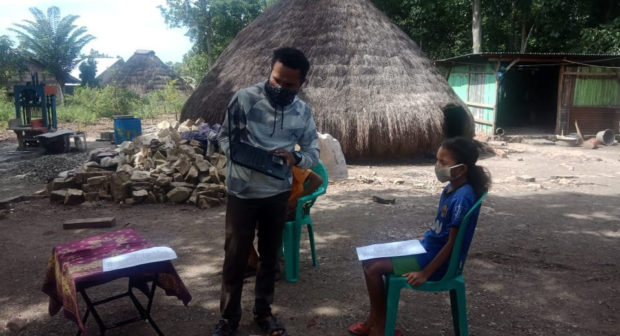Distance learning threatens to exacerbate education inequality in Indonesia

Remote learning: Teacher Fransiskus Xaverius Faimau, 37, shows a student study materials on his laptop outside her home in North Central Timor regency, East Nusa Tenggara. Many teachers in Indonesia like Fransiskus have gone the extra mile to teach students who lack access to the internet or even electricity, as schools remain closed during the COVID-19 pandemic. (Courtesy of/school teacher Fransiskus Xaverius Faimau via The Jakarta Post/Asia News Network
JAKARTA — For the past four months, more than 60 million students across the nation have been forced to study from home during the COVID-19 pandemic. But online learning presents new obstacles, particularly with uneven access to technology and inadequate online teaching methods, and concern is now growing that remote learning could worsen inequalities in education.
A survey launched on Thursday by the SMERU Research Institute showed that while teachers in major cities in Java had proper facilities to teach their students online, teachers in villages, especially outside Java, have needed to visit their students’ homes to give and collect homework because of a lack of access to the internet and digital devices.
“Students [without access to technology] are mostly state school students in villages, especially outside Java. They are prone to experiencing losses in education,” Florischa Ayu Tresnatri, a researcher at SMERU, said in a public discussion Thursday.
Among other recommendations, the report urges the Education Ministry and Culture Ministry and local education agencies to make interventions to support teachers and to prevent inequalities in education from widening.
A similar survey by the education ministry found that most schools in Indonesia, or 97.6 percent of schools surveyed, have moved to remote learning during the pandemic. The survey, however, also found that distance learning has reduced teacher-student interactions significantly.
Article continues after this advertisement“During the pandemic, interaction between teachers and students has decreased. Students are only engaged in learning activities around two to four days a week, and for less than two hours a day,” Iwan Syahri, the ministry’s director general for teachers and educational staff, said.
Article continues after this advertisementIwan said the COVID-19 outbreak had challenged every teacher in Indonesia to adapt and find new ways to teach their students. The ministry, he said, had launched a website called Guru Berbagi to provide a space for teachers to share teaching methods and learning materials they have used during pandemic – either for online classes or in combination with online and offline classes.
“There are many ways to improve the learning process […] because we cannot wait until we reach the ideal internet connectivity rate [nationwide],” he said.
A 2018 Indonesian Internet Providers Association (APJII) survey showed that although 64.8 percent of the Indonesian population was connected to the internet, these numbers were centralized in Java.
Iwan said the ministry would soon launch an “adaptive curriculum”, which will be tailored to the needs of teaching and learning activities during pandemic.
“We have to adjust our expectations [toward education]. This [health] emergency is not only about how we shift to using new tools for learning,” he said.
Several community groups across the country, meanwhile, have taken the initiative to help students from economically disadvantaged families access online classes.
One such group is Wartawan Lintas Media (Journalists Across Media), which was established by journalists from various media outlets in Jakarta. The group’s latest project encourages people to donate old but still functioning smartphones to help students with no access to technology during the pandemic. The group is also collecting donations for mobile data plans.
Group member Agnes Theodora Wolkh Wagunu said the idea came when the group members were distributing aid, mostly food supplies, to low-income families in Jakarta in the early days of the pandemic. They often found that children from these families could not access online classes because their parents did not have devices for their children to use.
The group is also raising funds on crowdfunding platform Kitabisa.
Agnes said some people from other provinces had also reached out to the group for input on how to start similar campaigns in their regions.
“It will take a long time if we rely on the government – because of its bureaucracy. Not to mention that [intervention] also requires political will; and the government probably already has too much on its plate as well. So, now we are doing what we can to help others,” Agnes said.
In Yogyakarta, an initiative called BisaBelajar has been collecting donations for mobile data plans for students from low-income families.
The group found that the parents of many students who struggled to participate in online classes were low-skilled subcontract workers or tourism workers, a sector that has been hit particularly hard by the pandemic.
Hasnaa Naila, the initiator of the movement, said it started collecting its first batch of donations in April to help elementary and secondary school students in Yogyakarta who required internet access to prepare for the semester’s final exams.
In the second round of fundraising from May to June, BisaBelajar collected around Rp 5.2 million ($354), which it used to pay for mobile data plans for 160 students in Yogyakarta. The group will continue raising funds until students return to school.
“We understand that internet connectivity is not the only problem […]. We continue looking for what else we can do to help,” said Naila, who graduated from a university in Yogyakarta in February. “At the end of the day, we are doing the best we can to help.”
For more news about the novel coronavirus click here.
What you need to know about Coronavirus.
For more information on COVID-19, call the DOH Hotline: (02) 86517800 local 1149/1150.
The Inquirer Foundation supports our healthcare frontliners and is still accepting cash donations to be deposited at Banco de Oro (BDO) current account #007960018860 or donate through PayMaya using this link.